

Five education myths that Covid-19 shatters. Education has been practised and conceptualised internationally in ways that demonstrate its increasing privatisation, enabled through a dependency on numerical data and an adherence to a social world that is constructed and distorted through these numbers.
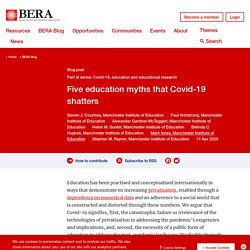
We argue that Covid-19 signifies, first, the catastrophic failure or irrelevance of the technologies of privatisation to addressing the pandemic’s exigencies and implications, and, second, the necessity of a public form of education to address the post-pandemic landscape. We do this through showing how five strong claims associated with contemporary education policy and practice have been revealed by Covid-19 to be myths, whose maintenance is a luxury made possible only in relatively stable times, and even then only through hard policy work made invisible through now demonstrably false claims that There Is No Alternative.
Myth 1: Teacher and leader efficacy can provide the solutions to children’s academic failure Conclusion. Is not a pedagogy. An article by Sarah Bergsen, Erik Meester, Paul Kirschner and Anna Bosman So-called ‘educational innovations’ in which the teacher assumes the role of ‘facilitator, mentor or coach’ do not appear to be very successful.
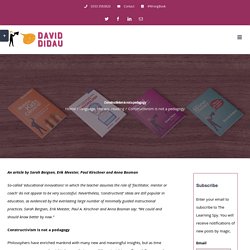
Nevertheless, ‘constructivist’ ideas are still popular in education, as evidenced by the everlasting large number of minimally guided instructional practices. Sarah Bergsen, Erik Meester, Paul A. A model for the learning process. And why it helps to have one. – teacherhead. One of the most powerful ideas I’ve engaged with recently is using a diagram to visualise a shared model of the learning process; using it to get a feel for how learning works in general but also to identify reasons for why it can sometimes not happen.
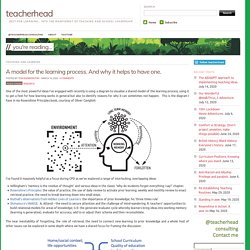
This is the diagram I have in my Rosenshine Principles book, courtesy of Oliver Caviglioli: I’ve found it massively helpful as a focus during CPD as we’ve explored a range of interlocking, overlapping ideas: Willingham’s ‘memory is the residue of thought’ and various ideas in the classic ‘Why do students forget everything I say?’ The near inevitability of forgetting, the role of retrieval, the need to connect new learning to prior knowledge and a whole host of other issues can be explored in some depth where we have a shared focus for framing the discussion: (NB: The coloured labels here represent the discussion and thinking we might have around the diagram.
Stop Abusing Neuroscience for Learning! Mirjam Neelen & Paul A.

Kirschner Neuroscience has been pillaged and plundered by often well-intentioned people who – this is a Dutch saying translated into English – have heard the clock chime/strike, but don’t know where the clapper/tongue is [people who think that they understand something, but fail to grasp the full story, real essence, or meaning]. Learning, making and powerful ideas. Donald Clark sur Twitter : "100 learning theorists in 100 days #100in100 SOCIAL CONSTRUCTIVISTS Piaget Vygotsky Bruner Margaret Donaldson 100 learning theorist. Why Content Knowledge is Crucial to Effective Critical Thinking - MindShift. Willingham wrote a paper, “How to Teach Critical Thinking,” in May 2019 for the Department of Education of New South Wales in Australia.
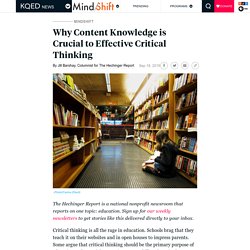
But it is entirely applicable to the American context. In the paper, Willingham traces the history of teaching critical thinking. More than a century ago, many thought that difficult subjects like Latin might improve thinking abilities. But scientists subsequently found that students who studied Latin didn’t do any better on tests than those who didn’t. There are mixed results from more recent studies in teaching students computer science. To be sure, there are basic logic principles that are true across subjects, such as understanding that “A” and “not A” cannot simultaneously be true.
To help student see analogies, “show students two solved problems with different surface structures but the same deep structure and ask them to compare them,” Williingham advises teachers, citing a pedagogical technique proven to work by researchers in 2013. SAGE Journals: Your gateway to world-class journal research. Wollstonecraft (1759-97) – Women and education... Mary Wollstonecraft, mother of Mary Shelley author of Frankenstein, bursts with originality in her thoughts on education rejecting the dry, dull teaching of the day, even recommending peer-justice by students.
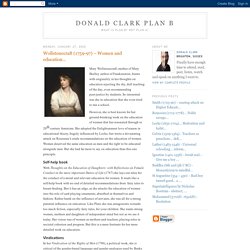
So interested was she in education that she even tried to run a school. However, she is best known for her ground-breaking work on the education of women that has resonated through to 20th century feminism. She adopted the Enlightenment love of reason in educational theory, hugely influenced by Locke, but wrote a devastating attack on Rousseau’s crude recommendations on the education of women. Women deserved the same education as men and the right to be educated alongside men. But she had far more to say on education than this one principle. Freire (1921-1997) - Banking theory of education and critical pedagogy... Learning theory and practice is rooted in northern hemisphere culture, with little attention paid to South America and Africa.
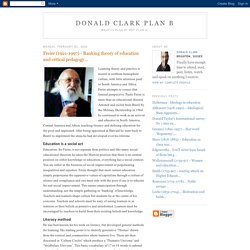
Freire attempts to correct that limited perspective. Paulo Freire is more than an educational theorist. Arrested and exiled from Brazil by the Military Dictatorship in 1964 he continued to work as an activist and educator in South America, Central America and Africa, teaching literacy and defining education for the poor and oppressed. After being appointed at Harvard he went back to Brazil to implement the ideas he had developed over his lifetime. Three Ways to Remove Image Backgrounds With Just a Click or Two – Ed Tech Fitness. Knowledge organisers, retrieval practice and the knowledge-rich curriculum – Notes of a Northern Liberal. Effects of performance feedback valence on perceptions of invested mental effort. The Best Way to Help Children Remember Things? Not “Memorable Experiences” - Excerpt from The ResearchEd Guide to Education Myths. Students are highly unlikely to gain understanding of scientific concepts unless the experiments are conducted after these concepts have already been taught.
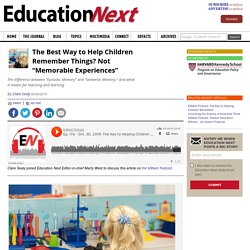
When we look back on our own school days, our strongest memories are probably a mix of big occasions—field trips, plays, and sports days alongside more personal events tinged with strong emotion. Things that happened that were really funny or sad, or that made us feel excited, interested, exhilarated, or angry. We don’t tend to remember vividly, if at all, actually learning the substance of math or English or design technology. Error - Cookies Turned Off.
This article aims to study one of the potential contemporary updates of pragmatist philosophy.
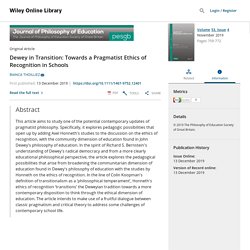
Specifically, it explores pedagogic possibilities that open up by adding Axel Honneth's studies to the discussion on the ethics of recognition, with the community dimension of education found in John Dewey's philosophy of education. To my politically-minded science colleagues and friends. Please do read and consider the ideas □
The Learning Scientists. Knowledge is a process of discovery: how constructivism changed education. This is the second of two essays exploring key theories – cognitive load theory and constructivism – underlying teaching methods used today.
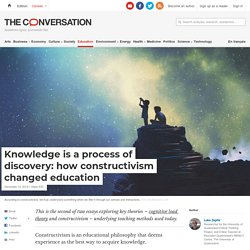
Constructivism is an educational philosophy that deems experience as the best way to acquire knowledge. We truly understand something – according to a constructivist – when we filter it through our senses and interactions. We can only understand the idea of “blue” if we have vision (and if we aren’t colour blind). Constructivism is an education philosophy, not a learning method.
So while it encourages students to take more ownership of their own learning, it doesn’t specify how that should be done. Christian Bokhove sur Twitter : "A frequently cited paper againt ‘generic skills’ is by Trucot & Sweller. I’m sure that for some the name Sweller, or the edutwitter ppl citing it, is enough to take it very seriously. I wonder, though, how many have actual.
My favourite study of 2019 in TES was Rohrer et al. ‘A Randomized Controlled Trial of Interleaved Mathematics Practice’ - Just what is the actual provenance of cognitive load theory as being pushed and shoe-horned into every recent education policy?… Knowledge is a process of discovery: how constructivism changed education. Seven Success Factors for Great Instructional Coaching » Instructional Coaching Group. Why are some instructional coaching programs more successful than others? Coaches and onsite professional developers often find themselves in high-stakes, critically important roles expected to lead school reform efforts with little or no professional preparation for successfully performing such tasks. They know they are there to be leaders of change, but without the most essential factors in place, they will not be as effective as they could be. After working with more than 150,000 coaches from around the world over the last 20 years, ICG experts have identified seven factors that must be in place in order for coaches to flourish.
Partnership. Breathing new life into the observation of teaching and learning in higher education: moving from the performative to the informative: Professional Development in Education: Vol 46, No 1. Excellence in higher education teaching has become a policy priority of governments worldwide in recent years. In the United Kingdom, for example, the introduction of the Teaching Excellence Framework in 2016 heralded an unprecedented focus on the quality of teaching. Set against the backdrop of such policy developments and wider global interest in teaching in the higher education sector, this paper discusses the conceptualisation and implementation of an innovative approach to observing teaching and learning as part of a faculty professional development project in an English university.
It examines the attitudes, perceptions and experiences of academic staff involved. Direct and indirect links between children’s socio-economic status and education: Pathways via mental health, attitude, and cognition. Abstract A child’s socio-economic status has been independently associated with poorer educational outcomes, slower cognitive development, and mental ill-health. However, while these factors clearly do not operate in a vacuum, testing all within a single study is challenging, and their interrelations thus remain largely unclear. We aimed to close this License. EEF Blog: Does research on ‘retrieval practice’ translate into classroom practice? EEF senior associate Prof. Rob Coe explains why, though there is lots of evidence to support the use of retrieval practice, there is still a question mark about how effectively it can be incorporated by teachers into lessons...
For the first ever EEF Teacher Choices trial, we are working with 70 science teachers to compare the impact of starting a lesson with a retrieval quiz, or starting with a discussion to engage interest. Marge shimamura. Can a Neuromyth Result in a Truce? We teachers feel passionately about our work, and so–no surprise–our debates and disagreements get heated. Few debates rage as fiercely as that between champions of direct instruction (with or without capital “D” and “I”), and champions of constructivism (in its many forms: project-based learning, student-centered learning, etc.). In a recent essay, writer and blogger Tom Sherrington would like soothe this ferocity by declaring the whole debate a myth. As his title declares: it’s a myth that “teacher-led instruction and student-centred learning are opposites.”
(Sherrington is British, so we can overlook the missing “e” from “centred.”) Study tries to check the idea of educational "value added" by teachers, by applying the same models to student height. Effect on height is nearly as big as on maths or reading achievement, Teacher Effects on Student Achievement and Height: A Cautionary Tale. The Question Matrix. □□ TeacherToolkit.co.uk sur Twitter : "It is highly probable that many teachers have never been given the time to observe a lesson taught by another teacher and certainly not one outside the department of their school. ⏱️ Take time to ask questions, to re. Fermi Questioning. @TeacherToolkit In 2010, Ross Morrison McGill founded @TeacherToolkit from a simple Twitter account through which he rapidly became the 'most followed teacher on social media in the UK'. Neuroscience Applied to Education: Mostly Unimpressive. Annual Research Review: Educational neuroscience: progress and prospects.
Building a culture of evidence and research use: Selected reading. Graham Nuthall and social constructivist teaching: Research-based cautions and qualifications. Outline AbstractKeywords1. Need for clarifications about social constructivist teaching2. Graham on social constructivist teaching3. Elaborations based on my own work4. An Error Occurred Setting Your User Cookie. This site uses cookies to improve performance. If your browser does not accept cookies, you cannot view this site. Setting Your Browser to Accept Cookies. Scholar. Pedagogical content knowledge reconceived: Bringing curriculum thinking into the conversation on teachers' content knowledge. 10. 10. What Is Technological Pedagogical Content Knowledge? – CITE Journal. Editors’ Note: For the benefit of readers who are unfamiliar with the notion of technology, pedagogy, and content knowledge (TPACK), we offer the following condensed and updated depiction by Mishra and Koehler (2007), which was presented originally at the annual conference of the Society for Information Technology and Teacher Education in 2007.
Judi Harris & Matt KoehlerSpecial Issue Guest Editors. 3 Practical Strategies for Cognitive Load Theory. Get your watermark free version by registering on our website. MARGE: A Whole-Brain Learning Approach for Students and Teachers – Arthur Shimamura. Deep learning? Planning for knowledge transfer: Responsive Teaching update. The problem: Students can answer questions, but only if they are posed in familiar ways: if we say “Cuban Missile Crisis”, they remember “1962”, but if we ask for “major events in the 1960s” they draw a blank. Students know the basics, but they can’t use them flexibly: they can tell you that 4 x 3 is 12, but they can’t tell you the factors of 12.Students can answer simple questions, but can’t use the same knowledge in more complicated questions: they know that Romeo is rash and Othello is jealous, but they struggle to contrast Romeo with Othello.Students don’t know when to apply their knowledge: when they examine a problem, they don’t recognise that they could use algebra to solve it.
In each case, students have some knowledge, but they struggle to transfer it; in each case, students’ learning has proved less deep and less flexible than we would hope. Challenge beyond Bloom’s. Modelling and Worked Examples. Simon Palmer sur Twitter : "Always loved the clean look of the @olicav / dual-coding inspired resources so gave it a go this weekend with 'Hitler's rise to power'. First try, so work to be done. I may also have spent far too long animating this in PowerPo.
Inquiry and Problem Based Pedagogy: Evidence from 10 Field Experiments. Durham Commission on Creativity in Education : Final report. Schools love the idea of a growth mindset, but does it work? The Beatles; All You Need is Heutagogy. Building a culture of evidence and research use: Selected reading. The beneficial side-effects of retrieval practice. Retrieval Practice - some messages from the research. The risks and unintended consequences of creative teaching. Thread by @informed_edu: "I'm having a bit of a Cognitive Load Theory day today. I want to highlight a few findings from this 2011 paper by Paas and Sweller (thread)
Films — Graham Brown-Martin. People remember 10%, 20%…Oh Really? More terrifying than putting out my first blog post, but here goes, my first sketchnote, inspired by @olicav . From a fabulous day of CPD with @teacherhead… Moodle. Collaborative professional learning: cultivating science teacher leaders through vertical communities of practice: Professional Development in Education: Vol 45, No 3. Children of similar cognitive ability have very different chances of educational success. Just Say No (To Providing Class Slides)? Revisiting Dylan Wiliam’s Five Brilliant Formative Assessment Strategies. PsycNET. Transforming Assessment in Higher Education. What we already know determines what, how, and how well we learn. Who Created Maslow's Iconic Pyramid? - Scott Barry Kaufman. Peps Mccrea sur Twitter : "5 papers on teaching expertise that are worth a scan: 1. Berliner 2004 2. Hattie 2003 3. Schempp 2002 4. Westerman 1991 $ 5. Wolff 2.
Cognitive Load GIF taken from my last presentation on the subject #MedEd #FOAMed… Delivering Scripted Instruction: A ‘Sort-Of’ Guide… – Sam Hall. The Teaching Excellence Framework, Epistemic Insensibility and the Question of Purpose - FORSTENZER - 2018 - Journal of Philosophy of Education. Presentations. The Snow Report. The Learning Scientists. The 74 Interview: Do Standards and Project-Based Learning Go Hand in Hand? Prof. Nell Duke Says Yes, & Looks at the Best & Worst of PBL.
Center for Education Policy Research at Harvard University. Intention and substance findings paper on primary school science 110219. Early Career Framework. 10.1007/s10648 019 09465 5. The use of illustrations when learning to read: A cognitive load theory approach - Torcasio - 2010 - Applied Cognitive Psychology. The relationship between inquiry-based teaching and students’ achievement. New evidence from a longitudinal PISA study in England. Inducing Self-Explanation: a Meta-Analysis. Are educational videos rubbish? Antecedents, correlates and consequences of faculty burnout: Educational Research: Vol 60, No 2. Home - Visible Classroom. EdPractices 21. The language of curriculum. Why Growth Mindset Still Has Some Growing to Do. 4 Questions to ask. Cognitive Load Theory and its application in the classroom. Thread by @JulesDaulby: "Doing a thread on inclusive and then I'm going to design some so if you'd like one I'll give it a go Top tips 1/11 Tip […]" #KnowledgeOrganisers.
Simplifying Cognitive Load Theory. Annual Research Review: Educational neuroscience: progress and prospects - Thomas - - Journal of Child Psychology and Psychiatry. Learning Theory – Richard Millwood. Learning Theory v5.